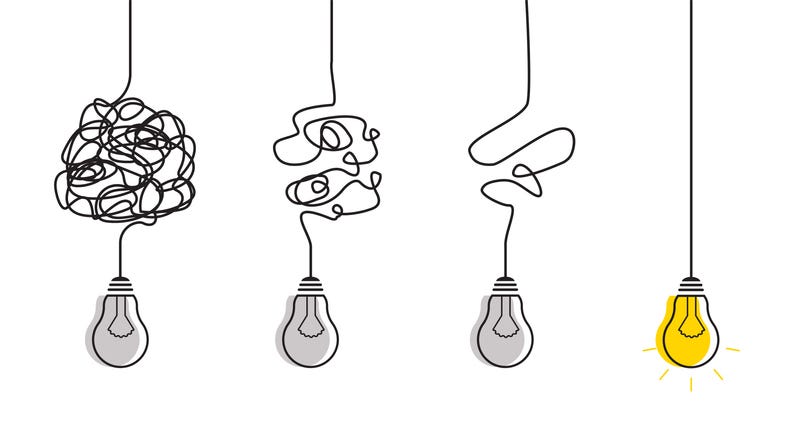How I Remember Everything I Learn
The Mastery Letter #5
I work as a consultant in Big Tech.
As a consultant I am forced to teach new cloud technology to customers in a short period of time.
These are the strategies I've come up with along the way.
On all of the new projects I’ve jumped on, I’m forced to learn new features, concepts, technologies and consult/sell to customers in a short period of time.
You figure out what sticks and what doesn’t very fast.
I’ve learned it’s always the simpler the better. More analogies are better.
No matter how technical or intelligent someone is they are still human, and simple, layman’s terms always work best.
I will take complex concepts and features and challenge myself to simplify into 1-2 sentences in their words.
This exercise really makes you think about how to distill and consolidate to find out what components actually matter and contribute to understanding the concept.
20% of the actual information and about a concept gives 80% of the understanding.
Point is, you have to learn how to learn, and a huge component is to keep it simple.
Breaking everything down into parts to understand them.
Here is the Learning pyramid that I use.
The fastest way to learn is to listen to a mentor, or someone ahead of you in the skill, and then repeat what they do.
Take notes of what they say, how they say it, figure out why they say it later.
Next you want to start the thing ASAP.
For example, I would write down enough info that I can repeat back to the customer in order for me to be able to get on the call with them.
Any questions I don't know, I take down and figure it out.
Any part of the process that a ran into confusion, I figured it out as I go.
I learned 90% of the job while on the call with the customer.
This is how any skill is.
Take action first, learn as you go
You learn by taking action with minimal information needed, build more iterations and improvements later.
It gets the difficult part of starting and the butterflies out.
I had people on my team who spent months and months learning as much as possible to prepare for customer calls, only to be stumped anyways on the call.
Not to mention they had so much anxiety built up, they performed even worse.
We will call them Group A.
There is an important lesson here.
What did they do wrong?
There is only so much you can learn before jumping into the deep end and experiencing it.
They were better off writing down some scripts, knowing the fundamentals, and then diving right in to figuring out all of the rest later.
20% of the job was the shit they had already learned. They just needed to fill in the other 80% by doing the thing.
They spent months on a few percentage points, while another group, we will call Group B, jumped straight in, took action, and learned as things happened.
Group B learned the bare minimum, (20%) then dove in to get the experience to learn the rest (80%).
They learned it from taking action.
This is exactly my experience in starting an online business.
I could either research for years and or read a book, buy a course and take action NOW.
All I needed to know was that I need to have a niche, writing 3-5 tweets a day, engage for 30 minutes, write a newsletter weekly and let time do the rest.
No arbitrary goals.
Just do the thing and do it consistently for years.
Teach the thing
Next, after you've taken action, you want to teach others, whether it be people in your work, school, community group, spouse, friend etc.
I always need to talk about the thing in order to really solidify it.
Even if you try and fail at teaching it, you will be surprised at how you can formulate your thoughts as you go because you have a "goal" of teaching it.
Teaching it almost unlocks a superpower where you access a different part of your memory in order to help the person understand.
This allows me not only to spread knowledge but also retain the information.
2 birds with one stone.
Keep it simple
When you are learning new skills, it's important to focus on a few things.
Don't try to learn multiple skills at once.
You only have x amount of willpower in a day and whether you feel it or not, you will not be better off.
Focus on 1 thing and master it.
I like to focus on health, wealth and relationship skills because these are the most important pillars of life.
Ex. of skills within these pillars:
Health = Learning a lifting routine, rock climbing, martial arts, nutrition, play the guitar, optimizing the body
Wealth = learning business, cloud security, plumbing, personal finance, investing, productivity
Relationships = learning about psychology and how to socialize, studying game for short term dating or studying how to build a fulfilling long-term relationship
You’ll find many sub domains within these that you’ll have individual skills you can learn.
Focusing on your weaknesses is also a waste of time.
You are only going to get incrementally better just to be mediocre at them.
Becoming a master of none is not fulfilling.
Focus on your strengths.
There is a multiplier effect when you double down on a few high yield habits/skills and master them.
There is a calming and cathartic, feeling of really simplifying your focuses and intensifying them.
In a distracted world, this is your superpower.
While others jump from one thing to the next chasing cheap dopamine and novelty, you will be getting so far ahead by being hyper focused on your goals using systems.
These systems eventually make your goals/habits/skill mastering seem effortless and automated.
The workflow I use is: Learn > Take Action > Track results > Make adjustments > Simplify & Automate
First 20 hours of learning a skill you will learn the most.
Most take years to even start, so you'll already be winning.
Aim to just start and suck ass.
Laying the foundation is the scary part and it’s easy once you get past the starting part.
Sleep, diet and exercise increase your ability to learn. It optimizes your cognition.
Make sure to get these mastered first.
Fuck your passions, chase mastery
Passion is not necessary and will likely not be there at first.
Passion follows mastery.
If you happen to have passion, good, this will help the feedback loop of getting through the boring reps.
You also need the proper mindset.
Understand monotonous practice of high leverage skills in order to provide value to the world.
As you chase mastery, you will likely slowly move closer to the things you like, until you find your final thing, which is your life’s task.
Understand things so well you can explain in a simple fashion.
Connect your goal to a skill and have crystal clear clarity.
Find a book on your skill. Deploy what you learned in the book so you can acquire a skill, don’t collect ideas.
Learn in the afternoon, take action in the morning while your willpower is maxed out.
Knowledge stacks, if you get good at one thing, it allows you to understand this other thing, which allows you to learn this other thing at a different depth.
Learn in the afternoon inswarms through audible, YouTube, mentors, courses, podcasts etc.
Get so good that others can’t stop you.
“Boos don’t block dunks” - Kobe.
Reading teaches you skills > Skills are utility > Utility gives you something others don’t have > makes you an unstoppable competitor.
Prime your environment
Setup of your environment for skill mastery.
I call my apartment an incubation chamber of learning.
My tv is mostly for YouTube learning, my headphones are always charged and ready for audible while cooking, lifting or walking.
Everything is decluttered, quiet, clean, minimalistic and primed for learning.
You don’t need many materials to be fulfilled.
Keep your environment simple and organized. No need for clutter is just becomes a burden on your mind. Rid yourself of useless clothes and trinkets.
Simplify and minimize and you will be at peace.
This will set the stage for learning and mastering a new skill now that you have more bandwidth and less clutter.
Dan Koe has a great framework to use for learning.
“Fill” your mind with information in the afternoon or evening, audible while walking or cooking is my favorite.
“Empty” the information throughout the day while working out, hiking, nature, walking, things you enjoy etc. good ideas spawn in your sub conscious during these times. I like to use iPhone notes to throw ideas down. Later I will take those ideas and move them into a more serious area of my OneNote
“Use” the next morning by taking action, building, doing, writing your ideas down to flesh them out.
Complexity is used by dumb people to seem smart.
Simplicity is used by smart people to create value in the world.
Less is more.
Simplicity is brilliance.
Break down complex concepts into simple ideas.
It’s easy to use jargon and technical terms to make yourself seem intelligent.
Taking a complex concept, deconstructing it, and rebuilding that puzzle in a more digestible way is a massively important skill. Memorizing complex jargon is easy.
Explain a concept is easy.
Simplifying it is not.
When you have thought something out enough to where you can explain it to anyone, in layman’s terms, using metaphors and analogies, that is when you understand the topic.
You can then provide value to others much faster and more efficiently by articulating it in a simple, relatable fashion.
I call these “one liners” or “golden nuggets” in my big tech world.
When you can easily teach the thing to youngsters, you've acheived mastery.
On the journey to mastery, don't get stuck in planning.
Learn the minimal amount to get started and solve problems as you go.
You'll learn 10x faster this way.
Smell ya' later.
-Brandon
____






